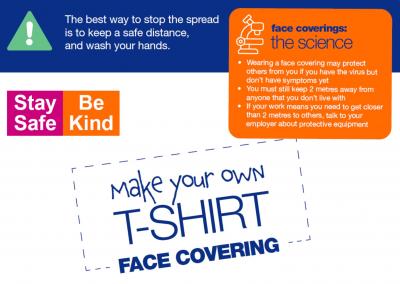Evidence suggests that, while face coverings do not protect the person wearing them from coronavirus, they do provide some protection for others if the wearer has the virus but hasn’t realised it. Face coverings do not provide enough protection for the wearer to safely go closer than 2 metres to others, so social distancing remains the most important thing people can do.
The guidance says people should wear a face covering in enclosed public spaces where social distancing is more difficult, in particular for short periods in places where people may come into contact with others they do not normally meet, for example, in some shops. In some clinical settings such as outpatients or going to see the GP, people may be asked to wear a face covering or have a face mask provided.
From next Monday 15 June, people must wear a face covering on public transport. They should be prepared to remove their face covering if asked to do so by police officers and staff for the purposes of identification.
The date coincides with the next phase in the Government’s easing of Covid-19 restrictions, with non essential retailers permitted to open provided they have taken steps to ensure social distancing.
The council has created a handy, step by step guide to show people how they can make their own face covering out of an old T-shirt.
Councillor Jasbir Jaspal, the City of Wolverhampton Council's Cabinet Member for Public Health and Wellbeing, said: "Face coverings do not replace social distancing, good hand washing and good hygiene as the most effective measures we should all adopt to prevent the spread of coronavirus.
"However, if you do need to go out and about, please consider wearing a face covering if you are somewhere where you will be around other people – and remember that face coverings will be mandatory on public transport from next week. Wearing one may not protect you, but it could help protect others if you have coronavirus but don't realise it.
"You can make your own face coverings at home and it can be as simple as a scarf or bandana that ties behind the head, as long as it covers your mouth and nose and allows you to breathe comfortably.”
To safely wear a face covering, people should wash their hands or use hand sanitiser before putting it on and taking it off, avoid touching their eyes, nose and mouth at all times, and wash it after every use. When taking the face covering off, do not touch the part that has been in contact with the nose or mouth. Used face coverings should be stored in a plastic bag until they can be washed.
Face coverings are not the same as face masks, which should be worn by frontline workers who come into close contact with others.
Residents are reminded they must continue to follow social distancing guidelines to help prevent the spread of coronavirus. Everyone must:
- stay at home as much as possible
- work from home if you can
- limit contact with other people
- keep your distance if you go out
- wash your hands regularly
- stay at home and self isolate if you or anyone in your household has symptoms of Covid-19, including a high temperature, a new, continuous cough, or a loss or change to your sense of smell or taste.
Anyone, irrespective of age, should be tested if they have symptoms of Covid-19. Testing will usually be offered at home or at a drive through test centre. The test is most effective within 1 to 3 days of symptoms developing and should be carried out in the first 5 days. For more information, and to apply for a test, please go to Coronavirus (COVID 19). If you do not have access to the internet, please call 119. All appointments must be booked in advance.
Anyone in Wolverhampton who tests positive for Covid-19 will be contacted by NHS Test and Trace and will need to isolate and share information about people that have been close contacts recently.
The latest information and guidance around coronavirus is available at GOV.UK and on the council’s own coronavirus pages at Coronavirus advice and information. There’s lots of advice on how people can protect themselves and their families from coronavirus from the NHS at Coronavirus (COVID-19).
The council’s Stay Safe, Be Kind campaign offers clear and simple advice about how people can help themselves, and how they can support others who may be particularly vulnerable at this time. For more information, please visit Stay Safe, Be Kind.
